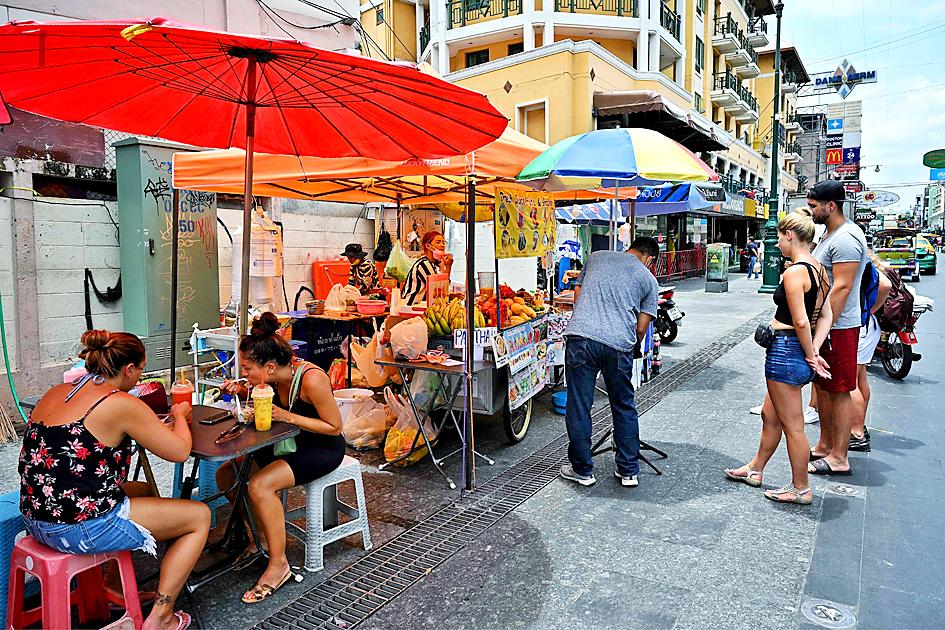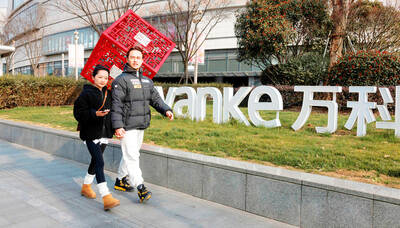Thailand’s economy grew 2.2 percent in the first quarter, as exports and tourism rebounded after the relaxation of COVID-19 pandemic restrictions, the National Economic and Social Development Council said yesterday.
During the pandemic, Southeast Asia’s second-largest economy suffered its worst economic performance since the 1997 Asian financial crisis, with visitor numbers crashing from about 40 million annually.
However, this month, the tourism-dependent kingdom dropped almost all restrictions for fully vaccinated visitors, including the need for COVID-19 tests to travel.

Photo: AFP
“The export sector is good... The tourism industry is getting better due to the relaxation of entry requirements for tourists,” council Secretary-General Danucha Pichayanan said.
The agency said the economy grew by 2.2 percent in the first quarter compared with the same period last year, and by 1.1 percent compared with the previous quarter.
The figures are a stark turnaround from the depths of the pandemic, which saw the economy contract 6.1 percent in 2020.
The agency said global market volatility from Russia’s invasion of Ukraine, and a slowdown in China’s economy thanks to virus lockdowns across various cities, were affecting the pace of the kingdom’s economic recovery.
Ukraine is a key exporter of fertilizer and the war has reduced supply in Thailand.
The Thai government has sought to ease the shortage by sourcing fertilizer from Saudi Arabia.
The agency also raised its inflation forecasts this year to between 4.2 and 5.2 percent, up from the earlier range of 1.5 to 2.5 percent.
Danucha attributed the inflation increase to rising energy prices.

CHIP RACE: Three years of overbroad export controls drove foreign competitors to pursue their own AI chips, and ‘cost US taxpayers billions of dollars,’ Nvidia said China has figured out the US strategy for allowing it to buy Nvidia Corp’s H200s and is rejecting the artificial intelligence (AI) chip in favor of domestically developed semiconductors, White House AI adviser David Sacks said, citing news reports. US President Donald Trump on Monday said that he would allow shipments of Nvidia’s H200 chips to China, part of an administration effort backed by Sacks to challenge Chinese tech champions such as Huawei Technologies Co (華為) by bringing US competition to their home market. On Friday, Sacks signaled that he was uncertain about whether that approach would work. “They’re rejecting our chips,” Sacks

Taiwan’s long-term economic competitiveness will hinge not only on national champions like Taiwan Semiconductor Manufacturing Co. (TSMC, 台積電) but also on the widespread adoption of artificial intelligence (AI) and other emerging technologies, a US-based scholar has said. At a lecture in Taipei on Tuesday, Jeffrey Ding, assistant professor of political science at the George Washington University and author of "Technology and the Rise of Great Powers," argued that historical experience shows that general-purpose technologies (GPTs) — such as electricity, computers and now AI — shape long-term economic advantages through their diffusion across the broader economy. "What really matters is not who pioneers

BUBBLE? Only a handful of companies are seeing rapid revenue growth and higher valuations, and it is not enough to call the AI trend a transformation, an analyst said Artificial intelligence (AI) is entering a more challenging phase next year as companies move beyond experimentation and begin demanding clear financial returns from a technology that has delivered big gains to only a small group of early adopters, PricewaterhouseCoopers (PwC) Taiwan said yesterday. Most organizations have been able to justify AI investments through cost recovery or modest efficiency gains, but few have achieved meaningful revenue growth or long-term competitive advantage, the consultancy said in its 2026 AI Business Predictions report. This growing performance gap is forcing executives to reconsider how AI is deployed across their organizations, it said. “Many companies

China Vanke Co (萬科), China’s last major developer to have so far avoided default amid an unprecedented property crisis, has been left with little time to keep debt failure at bay after creditors spurned its proposal to push back a looming bond payment. Once China’s biggest homebuilder by sales, Vanke failed to obtain sufficient support for its plan to delay paying the 2 billion yuan (US$283.51 million) note due today, a filing to the National Association of Financial Market Institutional Investors showed late on Saturday. The proposal, along with two others on the ballot, would have allowed a one-year extension. All three